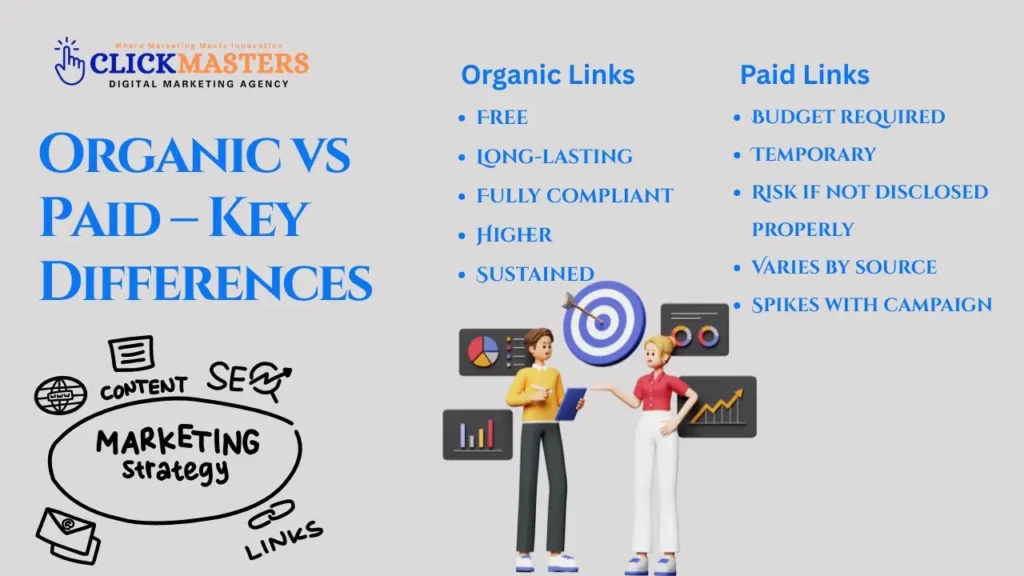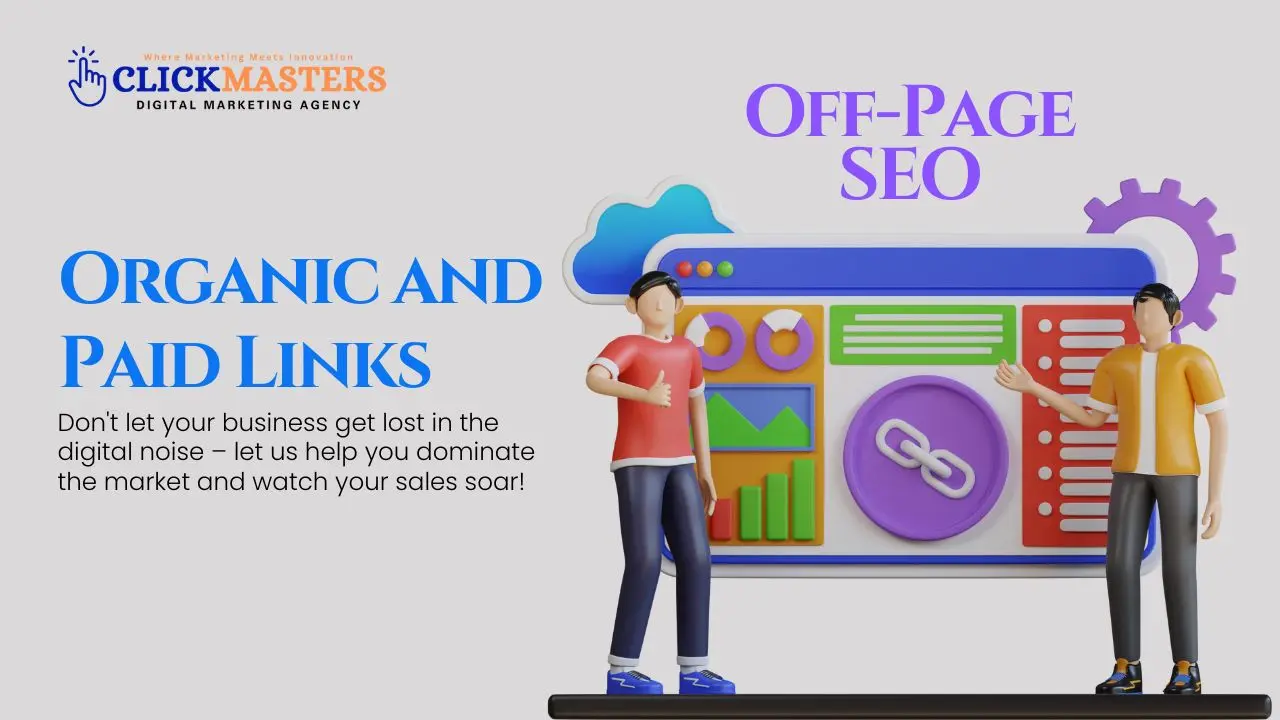In search engine optimization (SEO), off-page SEO is as important as on-page SEO. One of the most crucial aspects of off-page SEO is link building. Links are key in helping your website rank higher on search engines like Google. But not all links are created equal. Two of the most discussed links in the SEO community are organic and paid links. This article will examine these connections, their key distinctions, and how they influence your SEO strategy. Understanding the differences between organic and paid links, particularly when it comes to organic link building, will help you make more informed decisions about boosting your website’s visibility.
What Are Organic and Paid Links?
Before exploring the key differences, let’s first understand what organic and paid links are and how they work in off-page SEO.
What Are Organic Links?
Organic links, also known as natural backlinks, are the type of links that you earn over time. These links are not bought or paid for; they occur when other websites find your content valuable enough to link to it. Organic links are earned through the creation of high-quality content, genuine engagement, and trust from other reputable websites.
Search engines like Google favour organic links because they signal trustworthiness and authority. Websites that receive organic links are perceived as reliable information sources, which improves their ranking.
What Are Paid Links?
Paid links, on the other hand, are those that you acquire through financial transactions. You pay for these links to be placed on other websites, typically through paid ads or sponsored content. In many cases, these paid links are bought to help increase visibility and drive traffic to your website in the short term.
While paid links can deliver immediate results, they come with certain risks. Search engines, particularly Google, have guidelines against paid links meant to manipulate rankings. This means paid links must be used carefully and ethically to avoid penalties.
Key Differences Between Organic and Paid Links

Now that we know what organic and paid links are, let’s explore their key differences. Understanding these differences is crucial when building your SEO strategy.
1. Cost and Investment
The most obvious difference between organic and paid links is the cost.
- Organic Links: Organic links are free but require significant time and effort to earn. The process of earning these links involves creating valuable content, building relationships with other webmasters, and promoting your website. It’s a long-term investment that pays off over time.
- Paid Links: Paid links come with a direct cost. You must budget for paid campaigns, such as sponsored posts, link placements, or advertisements. While you may see immediate results in terms of traffic and visibility, paid links require ongoing spending to maintain.
2. Credibility and Trust
One of the reasons organic links are so highly valued is that they reflect credibility and trust.
- Organic Links: Since organic links are earned rather than bought, they carry more weight in the eyes of search engines. Google’s algorithm considers how many other high-quality websites link to your content. If authoritative websites link to you, it signals to Google that your content is trustworthy and relevant. This leads to higher rankings.
- Paid Links: Paid links are often perceived as less trustworthy. Google’s guidelines warn against using paid links to manipulate rankings. Although paid links can drive traffic to your website, they do not carry the same level of trust as organic links. If discovered, paid links can result in penalties from search engines, which can severely impact your website’s rankings.
3. Long-Term vs. Short-Term Results
Another important distinction is the timeframe in which you see results.
- Organic Links: Organic links tend to provide long-term benefits. Once you have earned a link from a reputable site, that link will continue to drive traffic and improve your SEO rankings for months or even years to come. The key is that organic links are sustainable and provide lasting value.
- Paid Links: Paid links, on the other hand, provide short-term results. Once you stop paying for the links, their impact fades away. Paid links can temporarily boost traffic or visibility, but they do not offer the same long-lasting benefits as organic links.
4. Risk and Stability
- Organic Links: Organic links are a more stable and risk-free investment in the long run. As long as your content remains valuable and other sites continue to link to you, your organic backlinks will help sustain your SEO rankings. They are not subject to the fluctuations of paid campaigns or changes in ad budgets.
- Paid Links: Paid links come with a higher level of risk. If your budget runs out or your paid campaigns stop, you lose the visibility and traffic the paid links provide. Additionally, if Google detects unnatural link-building practices or a paid link scheme, it may result in penalties or even a loss of rankings.
5. Link Quality
Finally, the quality of the link is another area where organic and paid links differ.
- Organic Links: The quality of organic links is typically higher. Websites that naturally link to your content tend to be authoritative sources in your industry or niche. Since these links are earned, they often come from relevant, well-established websites, which increases their value.
- Paid Links: Paid links can vary in quality. While some paid links may come from reputable websites, others may come from less trustworthy or low-quality sources. The risk of acquiring low-quality paid links is higher because, in many cases, you pay for placement without considering the authority of the source.
Start building organic links today and watch your SEO soar!
- Increase Organic Traffic.
- Improve Search Engine Rankings.
- Scale your campaigns.
Benefits of Organic and Paid Links in SEO
Both organic and paid links offer distinct benefits for your SEO strategy. Let’s look at how each type of link can contribute to your website’s success.
Benefits of Organic Links for SEO
- Higher Search Engine Rankings: Since organic links come from authoritative sources, they signal that your content is valuable to search engines. This can result in higher rankings in search results.
- Sustainability: Once you earn organic links, they continue to help boost your SEO over time. The more high-quality links you have, the more your rankings will improve.
- Cost-Effective: Organic link building requires an investment in content and relationship-building, but the links themselves are free to obtain. Over time, this can be more cost-effective than constantly paying for links.
Benefits of Paid Links for SEO
- Quick Results: Paid links offer immediate visibility and traffic. If you need a quick boost, paid links can help you reach your target audience immediately.
- Targeted Traffic: Paid links allow you to target specific audiences and niche markets. This can help increase the relevance of the traffic you receive and improve conversion rates.
- Brand Visibility: Paid links are frequently utilized in sponsored content, enabling your brand to reach a broader audience and gain exposure on high-traffic websites.
Which One Should You Choose for SEO Success?
When it comes to SEO, the best approach is often a combination of both organic and paid links. While organic links should form the foundation of your SEO strategy, paid links can be used to supplement and accelerate your efforts.
- If you’re focused on long-term success and building trust with your audience, prioritise earning organic links.
- If you need quick traffic or visibility for a specific campaign or product, paid links can help boost your efforts.
Ultimately, a balanced approach that leverages both types of links will give you the best chance of achieving SEO success.
Conclusion
Organic and paid links are important in off-page SEO, but they serve different purposes. Organic links are earned through high-quality content and build trust with search engines over time. Paid links offer short-term visibility and targeted traffic but come with a cost and risk. Understanding the differences between these two types of links will help you make informed decisions about your SEO strategy. Using both types strategically ensures your website achieves the best possible results in search engine rankings.
FAQs
1. What are organic links in SEO?
Organic links are natural backlinks earned through the creation of valuable content and genuine user engagement.
2. What are paid links in SEO?
Paid links are backlinks purchased through financial transactions, like sponsored content or ads.
3. How do organic and paid links differ in SEO?
Organic links are earned and sustainable, while paid links are bought and offer short-term benefits.
4. Are paid links safe for SEO?
Paid links are safe if used ethically, but can lead to penalties if part of manipulative schemes.
5. Can organic links improve my website’s SEO ranking?
Yes, organic links boost your SEO ranking by signaling trustworthiness to search engines.
6. How do I earn organic links?
You earn organic links by creating high-quality, valuable content that others want to reference.
7. Should I rely on organic links or paid links for my SEO strategy?
A combination of both is ideal, with organic links providing long-term value and paid links offering quick visibility.
8. How long does it take to see results from organic links?
It can take several months to see significant results from organic links.
9. Can paid links help boost my website’s traffic quickly?
Yes, paid links can drive immediate traffic, but their effects are short-lived.
10. Are paid links better for SEO than organic links?
Paid links offer short-term visibility, while organic links provide long-term SEO benefits.









